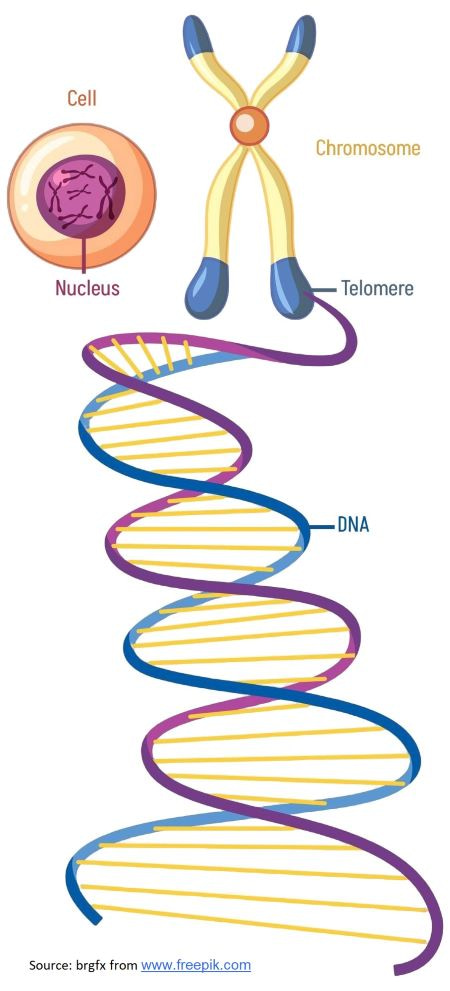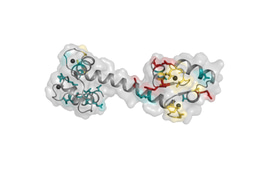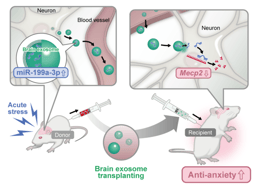Psychotropic drugs and metabolic adverse effects: are there consequences on biological aging?
Published in Cell & Molecular Biology, Biomedical Research, and General & Internal Medicine
For the last few decades, scientists have been studying how aging affects our cells, and how different factors, such as mental health and its treatments, might speed up or slow down this process. One hallmark of aging at the cellular level (i.e., biological aging) are the telomeres, the protective caps at the ends of our chromosomes. Just as the plastic tips prevent shoelaces from unraveling, telomeres prevent DNA unfolding, which could lead to accelerated aging and, therefore, to a premature cellular death.

During our lifespan, telomeres (which are often measured among leukocytes) naturally shorten as we get older. Thus, age-related diseases, such as type II diabetes and dementia, have been associated with a shorter telomere length.
In addition, certain conditions, like stress, inflammation, and some illnesses such as obesity, can make telomeres shorten even faster. However, telomere shortening can be reversible, thanks to the activity of an enzyme that elongates the chromosome extremities. Health improvements, such as significant weight loss, have been associated with an elongation of telomere length.
People with severe mental health disorders, such as major depression, schizophrenia, or bipolar disorder, are often affected by premature death, reporting an average reduction in life expectancy of about 10 years versus the general population. Although one would think of suicide as the principal reason for this life-expectancy gap, one of the actual main reasons is the early development of heart disease. There are several factors that can increase the risk of developing these diseases among the psychiatric population, such as poor lifestyle habits, the psychiatric disease itself, and the medications prescribed for treating depressive, manic or psychotic symptoms (i.e., psychotropic drugs). Indeed, psychotropic drugs are associated with a high rate of metabolic adverse effects, including weight gain, which is an important risk factor for heart disease.
Previous studies showed that among two age-matched groups of individuals (i.e., one healthy group and one including patients affected by severe mental health disorders), the latter group was associated with shorter telomere length. Additional studies tried to understand the role of the psychotropic medication in this association, with findings suggesting that the drugs might speed up or reverse this additional telomere shortening associated with the psychiatric disease.
This is the background knowledge that led us to the development of the present study performed in Switzerland, in which we analyzed one-year telomere changes among 200 individuals starting treatments with psychotropic drugs known to be associated with weight gain.
Interestingly, the overall one-year median telomere shortening in our sample was comparable to the yearly telomere attrition expected in the general population. This suggests that psychotropic drugs do not have a main and direct speeding up or reversing effect of telomere shortening. However, our results also suggest that inflammation, and that patients whose body mass index (BMI, Kg/m2) reached the obesity threshold after one year of psychotropic treatment were associated with greater telomere shortening. Moreover, to confirm our findings, we replicated our analysis in a public dataset based in the UK (UK biobank), in which increased BMI was again linked to faster telomere shortening, especially among patients taking weight-inducing psychotropic drugs.
This result further underlines the importance of lifestyle improvements preventing significant weight gain, especially among patients receiving weight-inducing psychotropic drugs, and it emphasizes the key role of healthcare providers. Indeed, by encouraging healthy lifestyle choices and thanks to careful clinical monitoring, healthcare providers can play a crucial role in helping psychiatric patients manage the side effects of their treatment while protecting their long-term health.
Follow the Topic
-
Translational Psychiatry

This journal focuses on papers that directly study psychiatric disorders and bring new discovery into clinical practice.
Related Collections
With Collections, you can get published faster and increase your visibility.
Moving towards mechanism, causality and novel therapeutic interventions in translational psychiatry: focus on the microbiome-gut-brain axis
Publishing Model: Open Access
Deadline: May 19, 2026
From mechanism to intervention: translational psychiatry of childhood maltreatment
Publishing Model: Open Access
Deadline: Feb 28, 2026






Please sign in or register for FREE
If you are a registered user on Research Communities by Springer Nature, please sign in